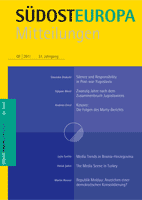Zwanzig Jahre nach dem Zusammenbruch Jugoslawiens
Twenty Years after the Break-down of Yugoslavia
Author(s): Stjepan MesićSubject(s): Politics / Political Sciences
Published by: Südosteuropa Gesellschaft e.V.
Summary/Abstract: In his article the author, who was the last President of the Yugoslav Federation 1991 and – until recently – President of Croatia for a period of ten years, raises two major questions: (1) Why was the Yugoslav Federation bound to break-down; and (2) why is regional cooperation a must for the countries that emanated from this break-down? Socialist Yugoslavia could not survive the death of Tito who had been the main “pillar” of its existence, Mesić explains. In Serbia, Slobodan Milošević followed the idea of creating a “Greater Serbia”. In Croatia, the political power that arose from free elections behaved in an autocratic and sometimes dictatorial manner. Tragically, the dissolution of Yugoslavia was accompanied by armed conflicts that carried elements of a foreign aggression, of domestic upheaval, of both a civil and a religious war. In this dirty and brutal war all parties – though in a different frequency – committed war crimes. The conflicts caused an atmosphere of bitterness and hatred; war propaganda on all sides was constantly stressing that a co-existence with “the others” would be impossible forever. Today, the future of the countries that emanated from former Yugoslavia mainly depends on getting to terms with this past and establishing good neighborly relations. Only by showing that they can regulate their mutual relations themselves, will these countries proof their maturity of becoming members of the EU. A spirit of co-operation must be connected with a reduction of prejudices, must accept one’s own guilt and must try to get rid of historical myths and instead try to accept the historical truth.
Journal: Südosteuropa Mitteilungen
- Issue Year: 2011
- Issue No: 02
- Page Range: 18-27
- Page Count: 10
- Language: German
- Content File-PDF

